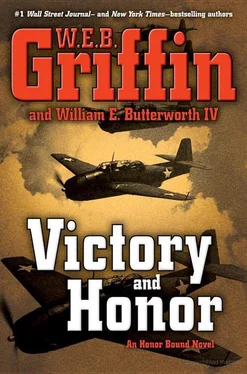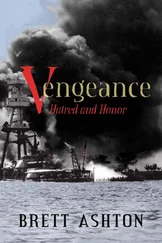“We’ll leave your aircraft right where it is and service it, and of course place it under guard. I recommend that you not leave the air base. That seems to cover everything. Is there something you need?”
“We’ve got fresh meat aboard,” Frade said. “We’re going to need several hundred pounds of ice to keep it from going bad.”
“That may pose a problem,” Colonel Stevens said.
“Which I’m sure you can solve, Colonel,” the natty colonel suddenly said.
Frade had not seen him walk up. Now that the natty colonel was standing beside Colonel Stevens, their sartorial difference was even more striking. And Frade now saw that the natty colonel’s uniform had pinned to the breast parachutist’s wings with three stars on them.
“I think the Argentine diplomats have been counting on their countrymen bringing them some decent meat, don’t you?” the natty colonel went on.
“You think it’s important obviously,” Colonel Stevens said, his tone making it clear he had just received an order he didn’t like.
“Yes, I do.”
“Then we’ll get some ice,” Colonel Stevens said.
“Thank you,” the natty colonel said, and started to walk back to the Horch.
Who the hell is this guy? Frade wondered, then decided that it was a question an SAA captain should not ask.
“If you’ll get into the three-quarter, gentlemen,” Colonel Stevens said, “you’ll be taken to your quarters. I’ll see you in the morning.”
The Luftwaffe officers’ quarters building was half destroyed, but the rooms to which an Air Forces sergeant took them were just about intact, except all the windows and the mirrors in the bathrooms were cracked or missing.
Frade had just sat on his bed—there were no chairs—when the natty colonel walked in.
The colonel greeted him: “I love your uniform, Captain—or should I say ‘Colonel’?—it looks like something General Patton would design.”
He put out his right hand.
His left hand held a bottle of Haig & Haig Pinch scotch whiskey.
As Frade shook hands, he was reminded of the story General Bendick had told about The Dawk showing up at Fighter One with two fistfuls of medicinal bourbon bottles.
“Sir, who are you?”
“Bob Mattingly, Colonel. We both work for Allen Dulles. And to set the ambience for our relationship, when no one senior to me is around, you may call me Bob. And with your permission, I will call you Clete.”
“Fine,” Frade said. “Bob, did you think of glasses to go with the scotch?”
“As a member of Oh, So Social, how could I forget a social amenity like that? The Air Forces sergeant who brought you here is getting us some as we speak.”
“Where’d you get the Horch, Bob?”
“The what? Oh, the car. It belongs to the Prince of Hesse. I pressed it into service. Magnificent machine, but I learned on my way here that it won’t go faster than fifty. Fifty kilometers. I finally decided it’s a parade car, designed to pass through hordes of screaming Nazis”—he paused and mockingly mimed Nazis giving the straight-armed salute—“but not designed to be used on the road.”
Clete laughed.
He said: “You’ve got it in low range, four-wheel drive. There’s a lever on the floor, next to the gearshift.”
“You know the car?”
“As a fellow member of Oh, So Social, I of course know everything about such social amenities as fine motorcars.”
Enrico Rodríguez stuck his head in the doorway. Frade motioned for him to come in. He did, followed by Stein, Boltitz, von Wachtstein, and Delgano.
“I know who you are, Sergeant Major,” Mattingly said in fluent Spanish. “Mr. Dulles told me Colonel Frade is never far from a man with a shotgun looking for someone to shoot.”
“A sus órdenes, mi coronel,” Rodríguez said.
“But these gentlemen—”
“SAA’s chief pilot, Gonzalo Delgano,” Frade said, pointing, “who is also a colonel in the Bureau of Internal Security. Karl Boltitz, former—”
“Trusted associate of Admiral Canaris,” Mattingly interrupted. “We’re working on finding your father, Kapitän. The last word we have is that he’s not dead. We just don’t know where he is.”
“Thank you,” Boltitz said.
“And that must make you Major von Wachtstein?” Mattingly asked.
“Yes, sir.”
Frade added: “And that’s Siggie Stein, our commo expert.”
Stein and Mattingly were shaking hands when the Air Forces sergeant appeared with a tray of glasses.
Mattingly was pouring generous drinks into them when another face appeared at the door.
It was an Air Forces lieutenant colonel. He wore a pink Ike jacket, pink trousers, a battered cap with a crushed crown, and half Wellington boots. A certain swagger—and the way he wore his uniform cap—identified him as a fighter pilot. He didn’t look as if he was old enough to vote, and in fact had been eligible to do so for only the past three weeks.
“And who, Colonel, might you be?” Colonel Mattingly inquired.
“My name is Dooley,” the very young officer said.
“Archer C. Dooley, commanding the 26th Fighter Group?” Mattingly inquired.
“ Deputy commander,” Dooley corrected him. “How did you know that?”
“As Colonel Frade and I were just discussing, Colonel, we are members of an organization that knows everything. Sergeant, does that telephone communicate?”
“Yes, sir.”
“Would you see if you can get General Halebury on it for me?”
“Yes, sir,” the Air Forces sergeant said.
“Colonel, what—”
“Colonel Dooley,” Mattingly interrupted him, “patience is a virtue right up there with chastity. I’m surprised you don’t know that.”
He took the telephone the Air Forces sergeant was holding out to him.
“Bob Mattingly, General,” he said into it. “I have Colonel Dooley with me. I wonder if you could give the colonel his marching orders over the telephone?” He paused to listen, then added, “Thank you, sir. Doing so will save a good deal of time.”
He handed the telephone to Dooley.
“Colonel Dooley, sir,” Dooley said, then listened for no more than thirty seconds and concluded the conversation: “Yes, sir, that’s perfectly clear.”
Then he took the handset from his ear and looked at it.
“And what did General Halebury have to say, Colonel Dooley?” Mattingly asked.
“He said that until I hear differently from either you or him, I am assigned to you; that I am to do whatever I’m ordered to do and not ask questions.”
“With a few minor exceptions, that’s it. How did you come here, Colonel? How, not why?”
“I came in a staff car, if that’s what you mean, sir.”
“Which has a driver? Or did you drive it yourself?”
“I’ve got a driver. There’s a group regulation that says majors and above have to have a driver.”
“And what kind of a staff car is it, Colonel?”
“A requisitioned Mercedes—a convertible sedan.”
“And is it adequately fueled for a round-trip to a destination some forty miles from here?”
“I just filled it up, sir.”
“Sergeant, if you would be good enough to pour Colonel Dooley a drink, you may then leave us.”
“Yes, sir.”
When the sergeant was gone, Mattingly said, “Now, Colonel, you may tell us why you came here.”
Dooley looked at the drink in his hand.
“Can I ask what’s going on around here, Colonel?”
Mattingly nodded. “After you tell us why you came here.”
“I wanted to see who was flying that Argentine Connie that I kept from flying into East Germany,” Dooley said.
“That was you in the P-38?” Frade said.
Читать дальше












